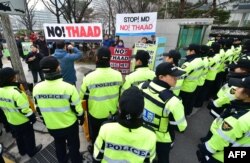To counter growing North Korean missile and nuclear threats, South Korea appears poised to consider importing a controversial U.S. missile defense system, according to officials in Seoul.
After the latest nuclear test by Pyongyang, Seoul has been weighing military and diplomatic options to enhance deterrence against future provocations by the communist country. Seeking a defense capability without alienating neighboring countries has been a difficult part of the effort. Recently, considering whether to host an advanced U.S. anti-missile defense system called THAAD, or Terminal High Altitude Area Defense, has emerged as part of Seoul's dilemma.
U.S. and South Korean military officials say South Korea should consider deploying the system, which is capable of tracking ballistic missiles up to 2,000 kilometers away, a range that would cover some parts of China.
Beijing’s objections
Beijing opposes the move and voiced its objections in early 2015.
“We had very candid and free discussions over the THAAD issue. It would be appreciated if Seoul takes account of China’s concerns and worries,” Liu Jianchao, assistant minister of China’s Foreign Ministry, told reporters during a March visit to Seoul.
Daniel Russel, an assistant U.S. secretary of state who was also traveling in Seoul at the time, fired back at Beijing, saying he found it “curious that a third country would presume to make strong representations about a security system that has not been put in place.”
Since then, Seoul has been walking a delicate line on the issue, keeping a noncommittal stance in an apparent attempt to quell the controversy. Pyongyang’s nuclear test, however, might have tipped the balance.
“Given that we are facing North Korean nuclear and missile threats, we will consider the deployment if it is warranted in the interest of national security,” South Korean President Park Geun-hye said during a televised national address a week after the nuclear test.
Shifting stance
On Friday, South Korea’s Defense Ministry appeared to advocate deploying such a system. Kim Min-seok, spokesman for the ministry, told reporters the deployment would be “helpful” for Seoul’s security.
Beijing tried to push back against Seoul’s apparent shifting stance on the issue. “We believe that any country, when striving for its own security, should also consider other countries’ security interests and regional peace and stability,” said Chinese Foreign Ministry spokeswoman Hua Chunying.
The U.S. State Department said Friday that Washington had not “formally consulted” with Seoul on THAAD deployment, and “no decisions have been made on a potential deployment of THAAD” in South Korea.
Kim’s comments came amid reports that North Korea might be preparing another long-range missile launch.
Citing recent commercial satellite imagery, 38 North, a North Korea monitoring website run by Johns Hopkins University’s School of Advanced International Studies in Washington, said Thursday that “a range of low-level activities” were seen at North Korea’s rocket launch site in Dongchang-ri. The website said the activities might be part of “early stages of preparation for launching a space launch vehicle."
Earlier, Japan’s Kyodo News Agency reported the launch could come in about a week, citing a government official.
Possible missile launch
Pyongyang last conducted a long-range missile launch in late 2012, when it successfully put into orbit an object that it said was a communications satellite, sparking concerns among U.S. military officials.
“Our assessment is that they have the ability to put a nuclear weapon on a KN-08 and shoot it at the homeland,” Admiral William Gortney, commander of the U.S. Northern Command, told reporters in April 2015, referring to North Korea’s new road-mobile missile.
U.S. officials say Pyongyang has not yet tested the missile.
Moon Seung-mook, a retired general who led the South Korean delegation in inter-Korean military talks in 2004, told VOA on Friday that Pyongyang could launch an advanced missile with a range longer than that of the missile fired in 2012, saying it recently improved facilities at the launch site.
Earlier this month, Pyongyang conducted its fourth nuclear test, claiming it was a successful test of a hydrogen bomb. International sanctions ban Pyongyang from conducting nuclear tests or launching ballistic missiles.
Baik Sungwon and Jee Abbey Lee contributed to this report.





